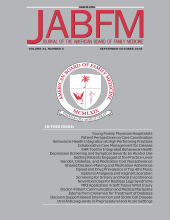Abstract
Purpose: Group medical visits (GMVs), which combine 1-on-1 clinical consultations and group self-management education, have emerged as a promising vehicle for supporting type 2 diabetes management in primary care. However, few evaluations exist of ongoing diabetes GMVs embedded in medical practices.
Methods: This study used a quasi-experimental design to evaluate diabetes GMV at a large family medicine practice. We examined program attendance and attrition, used propensity score matching to create a matched comparison group, and compared participants and the matched group on clinical, process of care, and utilization outcomes.
Results: GMV participants (n = 230) attended an average of 1 session. Participants did not differ significantly from the matched comparison group (n = 230) on clinical, process of care or utilization outcomes.
Conclusions: The diabetes GMV was not associated with improvements in outcomes. Further studies should examine diabetes GMV implementation challenges to enhance their effectiveness in everyday practice.
Diabetes group medical visits (GMVs) combine one-on-one provider visits and group diabetes self-management education, and they have demonstrated improvements in participant knowledge, self-efficacy, hemoglobin A1c (A1C), and systolic blood pressure (SBP) control.1 However, most diabetes GMV evaluations have consisted of randomized-controlled trials or pilot studies, rather than evaluations of ongoing programs. This retrospective, quasi-experimental study evaluated an ongoing diabetes GMV to describe attendance and program completion; to compare the 1-year change in A1C, SBP, low-density lipoprotein (LDL) cholesterol, and body mass index of participants and nonparticipants; and to compare 1-year receipt of microalbuminuria screening, emergency department visits, and hospital admissions.
Methods
The Diabetes Information and Support for Your Health (DISH) GMV began in 2009 and is held in an urban family medicine practice with 30,000 patients. Patients enroll in DISH via provider referral. DISH consists of four 2-hour sessions, although participants may attend more sessions if they desire. Hour 1 of each session is a 1-on-1 visit with a family medicine resident to discuss diabetes management challenges and solutions, and to schedule follow-up visits and laboratory tests. In hour 2, a certified diabetes educator leads group diabetes self-management education. Each week focuses on 1 or 2 topics, including glucose control, meal planning, physical activity, complication avoidance, and stress management.
After receiving institutional review board approval, study data were extracted from electronic medical records. The sample consisted of adults ≥18 years old with a type 2 diabetes mellitus diagnosis and at least 1 practice visit during July 2009 through February 2015 (n = 1499). Participants were patients who had attended at least 1 DISH session. A 1-to-1 propensity score–matched2 comparison group of nonparticipants was created based on age category, race, sex, area deprivation index (a measure of socioeconomic deprivation),3 and year of initial practice visit.
Each participant's initial DISH session date was their index date; their matched comparison group member was assigned the same index date. Clinical outcomes were compared from baseline to 1 year using hierarchical linear modeling, with the number of DISH sessions attended as a predictor4; microalbuminuria screening rates, evaluated using the McNemar test for correlated proportions; and occurrence of emergency department visits and admissions, evaluated using the Wilcoxon signed-rank test. Criteria were α = 0.05 and P < .05 for statistical significance for all tests.
Results
Table 1 shows participant and matched-group demographics and baseline measures. DISH participants (n = 230) were predominantly female (69.1%) and African American (87%); their mean age was 59 years. At baseline, participants had higher A1C (9.37% vs 8.24%; P < .001), lower SBP (133.23 vs.135.04 mmHg; P < .001), and higher LDL (117.84 vs.109.45 mg/dL; P < .001) than the comparison group (n = 230); more participants had also received a microalbuminuria screening (87% vs 59.7%; P < .001).
Demographics and Baseline Values for Participants in the Diabetes Information and Support for Your Health Group Medical Visit Program and Matched Nonparticipants with Type 2 Diabetes
Most participants attended only 1 session (63.8%); 9 (3.9%) attended 4 sessions. DISH participation and the number of DISH sessions attended were not significant predictors of improved A1C, SBP, LDL, or BMI; receipt of microalbuminuria screening; or reduced emergency department visits or admissions 1 year after DISH (P > .05).
Discussion
This evaluation of a family medicine practice's ongoing diabetes GMV revealed a low completion rate and null findings. Lack of practice resources for tracking referrals or making reminder calls may contribute to these findings. In addition, participants could experience barriers to ongoing participation, such as the time investments needed to travel and to attend the program.5 Patient feedback is needed to understand patients' experiences with DISH, including barriers to ongoing participation.
This study's retrospective, nonrandomized design limits the ability to draw causal inferences. Propensity score matching mitigated this limitation; however, unmeasured differences between participants and nonparticipants may remain. In addition, the study's urban setting and patient demographics may limit its generalizability. More “real-world” diabetes GMV evaluations in diverse populations are critical to identify contextual factors affecting GMV success.
Notes
This article was externally peer reviewed.
Funding: none.
Conflict of interest: none declared.
To see this article online, please go to: http://jabfm.org/content/31/2/279.full.
- Received for publication September 15, 2017.
- Revision received November 9, 2017.
- Accepted for publication November 9, 2017.







